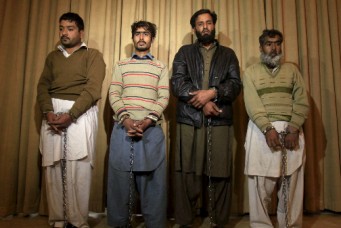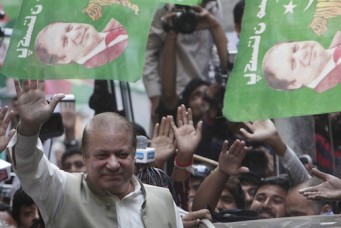How to Fix U.S.-Pakistan Relations
U.S. relations with Pakistan have been on the rocks since Navy SEALs buzzed into Abbottabad unannounced in a pair of modified MH-60 helicopters and took out Osama bin Laden. The move, which 68 percent of Pakistanis viewed as a “severe” compromise of their country’s sovereignty, according to a Gallup poll, prompted the humiliated Pakistani military to expel U.S. military trainers from the country and refuse visas to other American personnel.
U.S. relations with Pakistan have been on the rocks since Navy SEALs buzzed into Abbottabad unannounced in a pair of modified MH-60 helicopters and took out Osama bin Laden. The move, which 68 percent of Pakistanis viewed as a “severe” compromise of their country’s sovereignty, according to a Gallup poll, prompted the humiliated Pakistani military to expel U.S. military trainers from the country and refuse visas to other American personnel.
In response, the White House has suspended $800 million or more than one-third of its $2 billion annual military aid package to Pakistan. According to White House Chief of Staff William Daley, Pakistan has“taken some steps that have given us reason to pause on some of the aid which we were giving to their military.”
But cutting aid at a time when the U.S. already faces uncertain future relations with Egypt, another longstanding security ally in the Muslim world, comes with risks. Not only does the U.S. need Pakistani cooperation to combat insurgents along the Afghan border, it needs tacit consent to continue its highly unpopular CIA drone operations–credited by the Obama administration with killing at least 20 of Al Qaeda’s top leaders–from Shamsi air base in western Pakistan. The drone attacks, despite official Pakistani claims that they have ended, continue clandestinely, according to senior U.S. officials. The most recent attack occurred on July 5 in North Waziristan.
Pakistani cooperation, frosty though it is on drone and other covert action, could become more difficult as a result of cuts to military assistance. As Maleeha Lodhi, Pakistan’s ambassador to the U.S. from 1994–1997 and 1999-2002, recently told the Washington Post, “If you still need the relationship, which clearly the United States does, then it really doesn’t make sense to take action at this time because it leaves the United States with less, not more, influence with the Pakistani military.”
Daniel Markey, Senior Fellow for India, Pakistan, and South Asia at the Council on Foreign Relations, has similar concerns: “We are already hearing from the Pakistani military that they are likely to show that they can’t be pushed around,” he says. “They have some leverage in terms of supply lines into Afghanistan, so this is a two-way street.”
Maintaining U.S. – Pakistani relations, however, presents something of a wolf-by-the-ears conundrum.While the U.S. cannot afford to cut off aid to the poverty-stricken and nuclear-armed South Asian country, nor can it justify funding a military that has confessed to diverting counterterrorism funds to arm itself against India and that is suspected of secretly aiding Islamic militants in its quixotic attempts to curb Indian influence in Afghanistan.
There is also a case to be made that supplying counterterrorism aid to Pakistan is a questionable exercise. As Lawrence Wright recently mused in the New Yorker, “What would happen if the Pakistani military actually captured or killed Al Qaeda’s top leaders? The great flow of dollars would stop, just as it had in Afghanistan after the Soviets limped away… The Pakistani Army and the I.S.I. [Inter-Service Intelligence] were in the looking-for-bin-Laden business, and if they found him they’d be out of business.”
Two years ago Navin Bapat, assistant professor of international relations at the University of North Carolina, made a similar point when he argued that funding counterterrorism efforts in Pakistan created perverse incentives: “If [President Pervez] Musharraf realized that he would continue to be showered with U.S. aid for having a Taliban problem, what incentive did he have to disarm the Taliban?”
If the U.S. can neither release the wolf nor maintain the tenuous grasp on its ears, where does that leave the future of U.S. – Pakistani cooperation? For Bapat, there are no easy answers: “The U.S. can do little except stay the course and continue to pour in aid and resources to keep the Taliban at bay,”he writes on NPR.org. Markey, however, argues that there is a third way: “We have to look at other ways we can influence Pakistan–not just with aid.”
The war in Afghanistan in particular, he thinks, offers additional avenues for shaping Pakistani behavior. “The way we draw down troops and [execute the final stages of the war] can offer us some leverage over the Pakistanis,” he says. Right now, Pakistan’s military brass has serious concerns that the U.S. will leave Afghanistan in a way that will hurt Pakistani interests, explaining their continued support for Taliban fighters there. Working to align U.S. and Pakistani interests in Afghanistan in the final stages of the war, therefore, could move U.S. – Pakistani relations past the current aid debacle.
Ty L. McCormick is a Washington-based journalist and Clarendon Scholar-elect at Oxford University. His writing has been published by Foreign Policy, NPR, the Washington Post, the Cairo Review of Global Affairs and the Huffington Post, among others.




